Poorly maintained, outdated, overcrowded highways are unsafe. Period. Congress needs to budget for repairs, upgrades and expansion. Period.
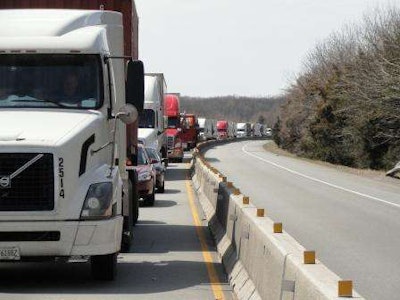 Traffic stopped on I-40 (Kevin Jones/CCJ)
Traffic stopped on I-40 (Kevin Jones/CCJ)Every member of the House transportation committee should be required to drive Interstate 40 between Memphis and Little Rock as a prerequisite for consideration of the next highway bill. Since formal proceedings begin today, that’s not going to happen.
But if they’d taken the trip in either direction last week, they routinely would have encountered delays adding an hour, maybe two, to a two-hour drive.
No big deal in the grand scheme of things? Only if this 100 miles is the only instance in the federal highway system. And I’m betting it’s not; it’s just the one example with which I’m all too familiar.
As a passenger car driver, the uncertainty is an inconvenience. But with local knowledge and modern traffic reporting technology, I know and use the alternate routes – though they are few and escape exits are far between.
And I’ll admit it: My spirits are lifted, like being one of the few people not seasick on a rolling ship, when from a parallel road I can see traffic backed up for miles on a major national artery. The long cut is “only” costing me 30 minutes – I’m way ahead of the game.
Except I’m not, really. We all lose.
Related: Congress told trucks need to pay more to fund highways
For more than two years (on this repair try) Arkansas has held trucking hostage by limiting one of the busiest freight corridors in the U.S. to one lane in each direction. This is the major east/west route into one of the leading intermodal hubs in the world, and it’s projected to be a leading freight route for the next 20 years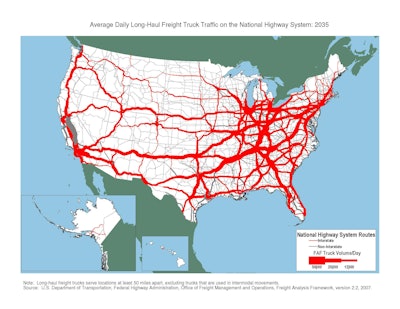
But Congress hasn’t shown much interest in saving trucking time and money lately, to say the least.
So, rather than once again arguing that money spent on highway improvements is money that directly creates jobs, directly benefits the consumer in lowering the cost of goods, and directly benefits nation’s economy by improving global competitiveness, I’m making an emotional plea: The road is abjectly unsafe, and non-professional drivers do not understand the risk – until it’s too late.
Last Friday evening had it all: fog, driving rain, lightning. I can’t report on the conditions in the one-lane segments, since I went around them, but I absolutely regretted getting back on the Interstate where traffic was moving again.
Kudos to the professional truck drivers for putting with up all of the 4-wheelers that had no business being on the crumbling highway: unsound equipment operated by people who tended to be either terrified or oblivious to the conditions. My favorites, for the contrast, were a pickup truck pulling a horsetrailer with no tail lights, going about 30 miles per hour in the passing lane – absolutely invisible from behind – and the young woman in a luxury SUV, blinkers flashing and interior dome light on, showing her on the phone as she flew past. These are typical examples, not extremes, of the cars on the road that night. And of the several cars that ended up off of the road.
Keep in mind, the lanes markings were virtually invisible for much of the way. I’d bet that if a tractor-trailer had veered into the icy swamps, it would have been followed by a line of cars whose drivers trusted the trucker to lead the way through the impenetrable gloom.
Related: Countdown to highway bill deadline
Then, miraculously, the road became wide and smooth. The reflective tape and center-stripes glowed. Same weather, same idiots behind the wheel, but an entirely different experience.
At an exit filling station jammed with minivans and rented moving trailers, the relief at having survived was obvious. Strangers at the fuel pumps swapped horror stories. Just another night on this bit of road, I wanted to tell them.
And I should have told them that, and to call their congressmen.
I’m not picking on Arkansas, my home. It’s a poor state and one that relies on federal support. Fair enough, since much of the traffic on I-40 neither originates nor terminates there. But it’s a prime example of why we need a strong, federal transportation policy that’s adequately funded.
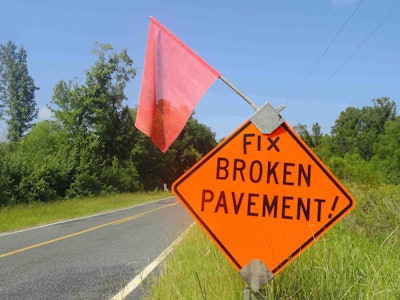 Photo: Kevin Jones/CCJ
Photo: Kevin Jones/CCJOtherwise, this mess is only going to get worse.
This ain’t about politics.

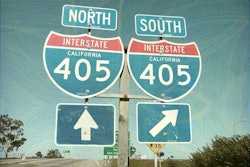

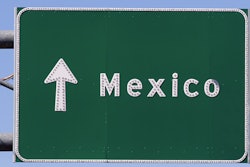
![Takayuki Hamaya Yokohama Tire COO[1]](https://img.ccjdigital.com/files/base/randallreilly/all/image/2014/01/ccj.Takayuki-Hamaya-Yokohama-Tire-COO1.png?auto=format%2Ccompress&fit=crop&h=167&q=70&w=250)





